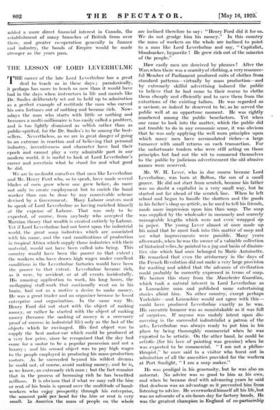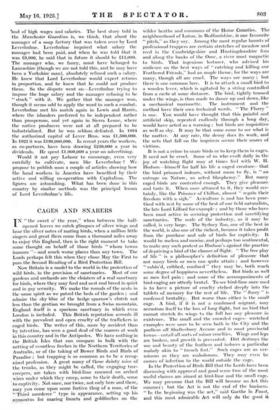THE LESSON OF LORD LEVERHULME
THE career of the late Lord Leverhulme has a great deal to teach • us in these days ; paradoxically, it perhaps has more to teach us now than it would have had in the days when instructors in life and morals like Dr. Smiles deliberately set out to hold up to admiration as a perfect 'example of rectitude the man who carved his own fortunes out of nothing and became rich: Now- adays the man who starts with little or nothing and becomes a multi-millionaire is too easily called a profiteer, and is too lightly dismissed as selfish rather than as public-spirited, for the Dr. Smiles's to be among the best- sellers. Nevertheless, as we are in great danger of going to an extreme in reaction and of believing that personal industry, inventiveness and character have had their epoch and cannot play a very admirable part in our modern world, it is useful to look at Lord Leverhulme's career and ascertain what he stood for and what good he did.
We arc in no doubt ourselves that men like Leverhulme and Mr. Henry Ford who, so to speak, have made several blades of corn grow where one grew, before, do . more not only to create employment but to enrich the hand worker than can be done by any conceivable scheme devised by a Government. Many Labour orators used to speak of Lord Leverhulme as having enriched himself at the expense of Labour. That was only to be expected, of course, from anybody who accepted the Marxian theory that wealth is created entirely by Labour. Yet if Lord Leverhulme had not burst upon the industrial World, the great soap industries which are, associated with his name, and the vast ramifications of production in tropical Africa which- supply those industries with their material, would not - have been called into being. This country would have been the poorer to that extent ; the workers who have drawn high wages under excellent Conditions in the Leverhulme factories would have been the poorer to that extent. Leverhulme became rich, as it were, by accident, or at all events incidentally. His amazing application to work, his long hours, the -unflagging staff-work that continually went on in his brain, -had not as a motive a desire to make money. He was -a -great-trader and an organizer because he loved enterprise and organization. • In the same way Mr. Henry Ford did not start with the object of making money, or rather he started with the object of making money (because the making of money is a necessary proof of success in industrial life) only as the last of the objects which he envisaged. His • first object was to Supply the best motor-car which could be produced at a 'very low price, since -he recognized that the day had come for a motor to he a popular possession and not a luxury ; and his second object was to pay high wages to the people employed in producing his mass-production motors. As he -succeeded beyond his wildest dreams he could not, of-course, avoid making money,, and he is, as we know, an extremely rich man ; but the fact remains that in the process of becoming rich he has benefited millions. It is obvious that if what we may call the hire or rent of his brain is spread over the multitude of hand- workers who enjoy prosperity through his enterprise, the • amount paid per :head -for the. hire or rent is very small. America_ the mass of people on the whole are inclined therefore to say: "Henry Ford did it,for us. We do not grudge him his money." In this country the mass of workers on the whole are inclined to point to a man like Lord Leverhulme and say, " Capitalist, bloodsucker,_hypocrite ! He grew rich out of the .miseries of the people" • Ilbw easily men are deceived by phrases 1 After the Wary when there was a scareityof clothing, a very resource- ful Member of Parliament produced suits of clothes from standard patterns—virtually by mass production—and by extremely skilful advertising induced the public to believe that he had come to their rescue to clothe them cheaply and efficiently and to save them from the extortions of the existing tailors. He was regarded as a saviour, as indeed he deserved to be, as he served the public well at an -opportune moment. He was rightly numbered among the public benefactors. -Yet when one came to look into the matter, which the public did not trouble to do in any economic sense, it was obvious that he was •only applying the well worn principles upon which many' men have accumulated- richeS—a large turnover with small returns on each transaction. For the unfortunate traders Who Were still acting on those principles but had not the wit to commend themselves to the public by judicious advertisement the old abusive names were reserved.
Mr. W. H. Lever, who in due course became Lord Leverlitilme, was born at Bolton., the son of a small grocer. He" did not start from scratch, because his father was no doubt "a capitalist in a very small way, but he started not far ahead of the scratch line. " When he left school and began to handle the shutters and the goods in his father's shop no article, as he used to tell his friends, made more impression upon him than 'soap: The soap was supplied by the wholesaler in uncomely and scarcely manageable lengths which were not even' wrapped up ih paPer. The yoUng LeYer" almOst at once made up hiS mind that he "must lOok into this matter of soap and See what iMprovementS were possible. Many years afterwards, when hewas the owner Of 'a Yaltiable collection of historical relies, he pointed to a jug and baSin of diminu- tive size which had once • belonged to "Marie Antoinette.
He remarked that 6"-en the aristocracy' days of the French ReN,Olutioddid not make a very large provision for washing and added that the advance-of civilization could probably be correctly expressed in terms of soap. We borrow this story "from the Maiicliester Guardian, which took a natural interest in Lind "Leverhulme as a Lancashire inan and published some " entertaining stories atOut "him. No other. country; except perhaps Yorkshireand Lancashire would not agree with ThiS- eould have produced Leverhulme exactly as he was. His eccentric humour was as unmistakable as it was full of surprises. If 'anyOne was unduly intent upon dis- covering in the successful industrialist a' Patron of the arts,- LeVerhuhne was always ready to 'put hini in his place by being thoroughly commercial when he was expected to be artistic. On the other hand, he could be artistic .(for his. love: of painting was genuine) when lie was :expected to be commercial. " I am hot a philan- thropist," he once said to a visitor who burst out In admiration of all the amenities provided for the workers at Port Sunlight, " I am a soap maker."
He was prodigal in his generosity, but he was also an autocrat. No advice was so good to him as his own, and when he became deaf with advancing years he said that deafness was an advantage as it. prevented him from listening to advice. He overworked himself all his life,but was an advocate of a six-hours day for factory hands. He was the greatest champion in England of co-partnership and of high wages and salaries. The best story told in the Manchester Guardian is, we think, that about the manager of a soap factory that was taken over by Lord Leverhulme. Leverhulme inquired what salary the manager • had been paid, and when he was told that it was 13,000; he said that in future it should be £15,000. The manager who, we fancy, must have belonged to Lancashire (though we are not told this, and he may have been a Yorkshire man), absolutely refused such a salary. He knew that Lord Leverhulme would expect returns in proportion, and he knew that he could not produce them. So the dispute went on—Leverhulme trying to impose the huge salary and the manager refusing to be " stuck " with it. We gather that the manager won, though it seems odd to apply the word to such a combat. Leverhulme met his match again in Lewis and Harris, where the islanders preferred to be independent rather than prosperous, and yet again in Sierra Leone, where the native producers were not at all prepared to be industrialized. But he was seldom defeated. In 1894 the authorized capital of Lever Bros. was £1,500,000. In 1922 it was £130,000,000. In recent years the workers, • as co-partners, have been drawing £250,000 a year in dividends. He spent £1,000,000 a year on advertising. Would it not pay Labour to encourage, even very carefully to cultivate, men like Leverhulme ? We propose to publish soon a couple of articles showing how the hand workers in America have benefited by their active and willing co-operation with Capitalism. The figures are astonishing. What has been done in this country by Similar methodS was the principal lesson of Lord Leverhulme's life.











































 Previous page
Previous page